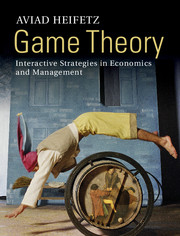Book contents
- Frontmatter
- Contents
- Foreword
- Part I Strategic interactions as games
- Part II Basic solution concepts for strategic form games
- Part III Prominent classes of strategic form games
- Part IV Uncertainty and mixed strategies
- Part V Advanced topics in strategic form games
- 14 Rationalizable strategies
- 15 Stability of equilibria
- 16 Games and evolution
- 17 Global games
- Part VI Dynamic games
- Part VII Repeated games
- Index
- References
17 - Global games
from Part V - Advanced topics in strategic form games
Published online by Cambridge University Press: 05 August 2012
- Frontmatter
- Contents
- Foreword
- Part I Strategic interactions as games
- Part II Basic solution concepts for strategic form games
- Part III Prominent classes of strategic form games
- Part IV Uncertainty and mixed strategies
- Part V Advanced topics in strategic form games
- 14 Rationalizable strategies
- 15 Stability of equilibria
- 16 Games and evolution
- 17 Global games
- Part VI Dynamic games
- Part VII Repeated games
- Index
- References
Summary
Equilibrium selection criteria
As we have seen, many games have more than one Nash equilibrium. In such games, additional criteria are needed in order to reach a more accurate prediction as to how the players will choose to play. Every such criterion is a selection criterion for choosing among the equilibria in the game.
In preceding chapters, we have already dealt with a number of such criteria. First, we saw examples of games in which, at some of the equilibria, some or all of the players choose weakly dominated strategies. In the Divvying up the Jackpot game, for example, we argued that it is natural to focus on equilibria at which the players do not choose such strategies. This is one possible criterion for excluding some of the equilibria in certain games.
We later discussed equilibria that are focal point equilibria – either because the payoff profile in such equilibria is more symmetric than in other equilibria, or because they are conspicuous by reason of external or historic causes that find expression not in the payoffs themselves but rather in the verbal description of the game.
In Chapter 9, we discussed two additional selection criteria.We defined when one equilibrium is more efficient than another. According to this criterion, if one of the equilibria in the game is more efficient than all the rest, the players will focus on that equilibrium. Moreover, if there is an equilibrium that is less efficient than another equilibrium, the players will not focus on the less efficient equilibrium.
The efficiency criterion does not always dovetail with another criterion we have examined – that of risk dominance. It is in games with multiple equilibria that the players are actually liable to be unsure as to how their rivals will play, and they may therefore choose strategies that appear to them as more secure on average. In a symmetric game of two players, they will hence play a risk-dominant equilibrium, which is not always the most efficient equilibrium.
In this chapter, we will present another approach for choosing among equilibria, one that is especially well suited to choosing between equilibria in coordination games.
Information
- Type
- Chapter
- Information
- Game TheoryInteractive Strategies in Economics and Management, pp. 284 - 300Publisher: Cambridge University PressPrint publication year: 2012
